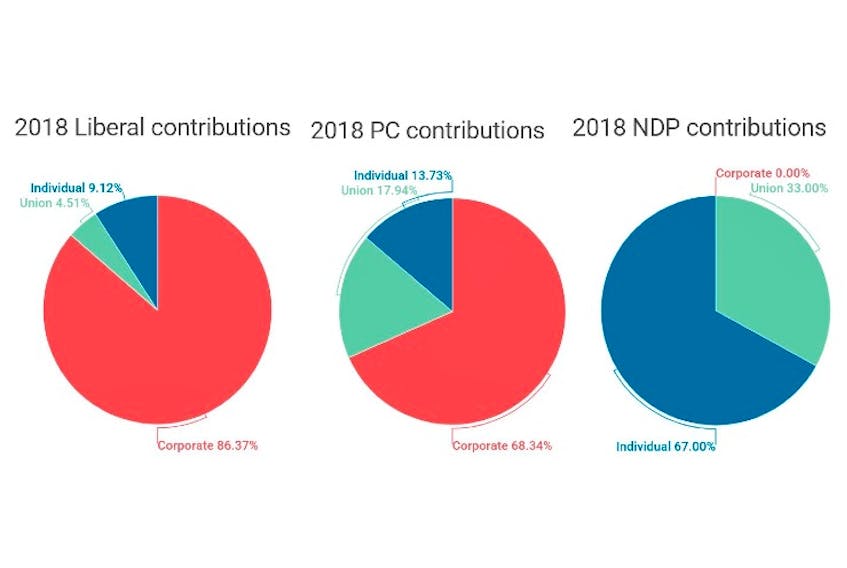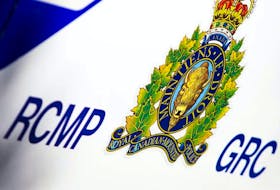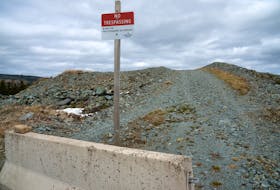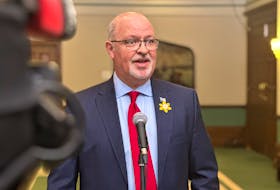ST. JOHN'S, N.L. — Corporations greatly outspent the public in supporting political parties in 2018, and even politicians believe that has to change.
Of the $1,007,770 in total donated to political parties in 2018, 78 per cent came from corporate interests. Unions chipped in 8.5 per cent, while individuals donated 14 per cent.
Newfoundland and Labrador is one of three provinces (Saskatchewan and Prince Edward Island are the others) without a ban on corporate and union donations or a cap on how much can be donated annually to a political party. The same three provinces also allow foreign and out-of-province donations.
Justice Minister Andrew Parsons is chair of the recently formed all-party committee on democratic reform.
Parsons says the figures don’t help public confidence in politicians.
“I don’t think it does anything to steer away the perception that exists. … We have to do something about (corporate) and union financing,” said Parsons.
Parsons says changes in political party financing have to happen, but he’s not sure if the public will like what the system would look like.
“In my personal opinion, not speaking on behalf of anyone here, I think there needs to be some capping on this. The question becomes, who finances the political system?” Parsons said.
“I don’t know if there’s a great demand for that, if people realize they’re going to have to start contributing for that. The reality is there is a cost to this.”
Progressive Conservative Leader Ches Crosbie says he also believes in a ban on corporate and union donations.
“My position is not a mystery. I’ve been on the record as favouring that we move beyond corporate and union donations. It should be a system based on individual donations,” said Crosbie.
“There’s a concern that allowing corporate monetary contributions leads to situations where corporate interests are far too close to the politicians they support.”
While the Newfoundland and Labrador Alliance has imposed a $5,000 limit on donations for the coming election, Crosbie says he intends to follow the election laws until they change.
“Liberals last year far out-fundraised us or the NDP. I’m simply not going to tie my hands behind my back. I have to play on the same playing field that they are,” he said.
While Crosbie has been critical of the all-party committee on democratic reform, he committed to his own all-party committee, should the existing committee be unable to complete its work.
Parsons says the committee is structured to be able to continue its work regardless of the outcome of the coming election.
The New Democratic Party has historically relied on union donations to fund its elections. In 2018, it was the only party not to receive any corporate contributions, although a third of their funding came from organized labour.
NDP Leader Alison Coffin says it wasn’t a conscious decision to not accept any corporate donations in 2018, but the NDP does support a ban on corporate and union donations.
“We do believe in democratic reform in that we think campaign finance reform is a small part of that and, yes, we are working towards banning corporate and union donations,” said Coffin.
“For optics, and to ensure we’re moving away from pay-for-play or getting access for payment, we are totally for removing that. We don’t think it’s appropriate at all. We realize this is going to put us in a position where we’re not going to be able to accept (donations) from our union sponsors.”
But Coffin points to the high percentage of individual donations flowing into the party, which she says would mean a ban would hurt the NDP less than the other parties.
The all-party committee on democratic reform does not have a specific time limit in its study, but is instructed to meet on a bi-weekly basis or at the call of the chair. The committee’s work will finish when its final report is submitted to the House of Assembly.
The numbers presented in this story are based on raw data supplied by Elections Newfoundland and Labrador. While the numbers have been audited by each party, Elections Newfoundland and Labrador’s review of the information is not yet complete. There might be a variation between the numbers in this story and in the final reports from Elections Newfoundland and Labrador.
Twitter: DavidMaherNL
RELATED









